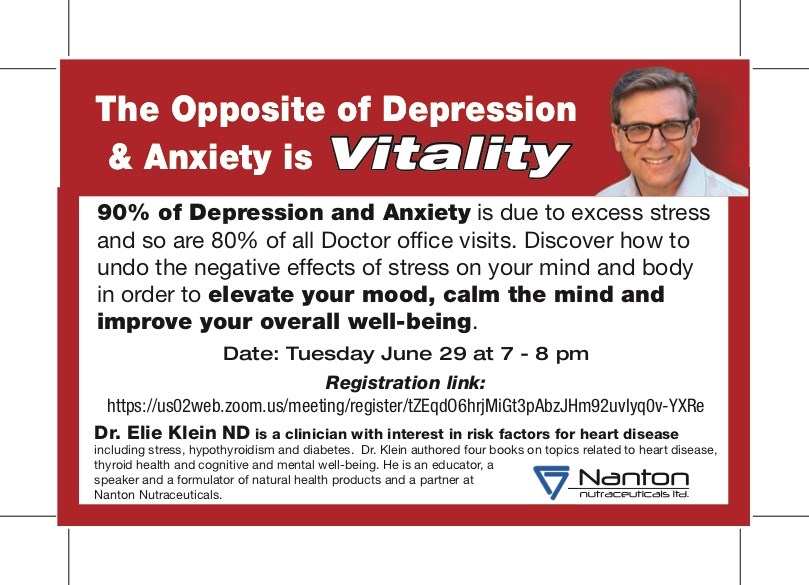90% of Depression and Anxiety is due to excess stress and so are 80% of all Doctor office visits. On June 29, 2021 at 7:00 pm, join Dr. Elie Klein and The Country Way Health Food Store for a FREE online seminar and discover how to undo the negative effects of stress on your mind and body and improve your overall well-being.
Reserve your spot
Depression and anxiety are rampant in our society. Antidepressant and anti anxiety mediations are some of the most commonly prescribe medications. Unfortunately, they may produce various unwanted adverse effects that may worsen one’s health.
When asked what is the opposite of depression or anxiety, most people, especially those who perhaps haven’t had significant depression or anxiety, may say happiness and relaxation. However, it is not as if those who aren’t depressed feel happy all the time.
Andrew Solomon, a prominent journalist and an author stated, based on his experience dealing with depression, that the opposite of depression is not happiness, but vitality. As a doctor, I relate to that, but more from a biological point of view. See, these conditions are largely the result of excess stress and the negative effects of the stress hormones on nerve and brain cells.
How Stress Contributes to Depression and Anxiety
Stress hormones suppress the “vitality” of the brain and nervous system cells, as well as other cells in the body. Whether brain cells or any other types of cells, our cells require a proper supply of energy to function properly. The stress hormones can limit or interfere with the cells’ ability to produce the energy they require for their healthy functioning.
How is energy (vitality) generated?
It is made from
- The food we eat and
- The oxygen we breath
Stress makes it more difficult for the brain and nervous system cells to generate energy from the food we eat and the oxygen we breath. While some stress is helpful at making us physically and mentally healthier and stronger, too much stress is harmful. If we could control the amount of stress we are exposed to, our brain cells and nervous system cells would recover, their vitality be restored and depression and anxiety subside.
Surprising Sources of Stress
We may be exposed to much more stress than we are aware of. See, stress isn’t just psychological or emotional in nature. Stress can be physical or chemical in nature.
Examples of non-psychological stresses include:
- Excessive strenuous activity
- Simply working too much without sufficient rest
- Processed food
- Radiation (ionizing or electromagnetic)
- Restrictive diets
All these types of stressors stimulate excess production of the stress hormones. We can try to avoid some of these stressors, while others are hard to avoid. Therefore, if we could counteract the production of the stress hormones, we’d be able to increase vitality and therefore, both our mental and physical well-being.
How to Counteract the Effects of Stress Hormones
In addition to eating healthy and ensuring adequate rest and sufficient sleep, we could supplement with certain vitamins and plants that happen to lower the stress hormones.
For example:
- Magnesium is a mineral known for its promotion of relaxation and a recent study even showed it was effective at lessening depression
- B vitamins, often work together, to nourish and energize the cells of the nervous system, and to induce relaxation
- Rhodiola rosea, a shrub that has to withstand the sub-zero and dark (stressful) conditions of its sub-arctic habitat, has been shown in studies to lessen symptoms of stress, depression and anxiety.
Rhoziva is a Canadian supplement that offers all these ingredients in one convenient nutritional supplement.
About the author:
Elie Klein N.D. is an Ontario-based clinician with interest in risk factors for heart disease including high blood pressure and cholesterol, stress, hypothyroidism and diabetes.

